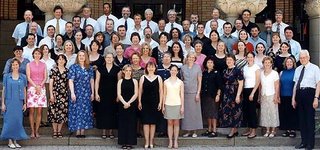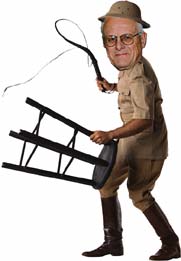Chanson de Breakdown
Both by intent and happenstance today, I was drawn back to some of the people and experiences of my wonderful four years at Denison University. There are two reunions coming up. One is the 45th (Oh lord)
 anniversary of The Denison Singers, of which I was a member for an all-too-brief time. (That's mando-me third from the left on the bottom row wearing black floral in the accompanying 2003 reunion photo taken by Bob Seith '74.) The second is a reunion of myself and two college roommates, now 40 or nearly so, with kids. Oy.
anniversary of The Denison Singers, of which I was a member for an all-too-brief time. (That's mando-me third from the left on the bottom row wearing black floral in the accompanying 2003 reunion photo taken by Bob Seith '74.) The second is a reunion of myself and two college roommates, now 40 or nearly so, with kids. Oy.I got to thinking especially about my time in the Denison Singers and the Concert Choir, and what an incredible experience that was for me. First and foremost I am a singer, and my first love is choral repertoire of the late Medieval and Early Renaissance periods. (How’s the dork factor now?) I could straggle in after a horrible day or a too-late night, but still manage to feel li
 ke a new person after a rehearsal. The camaraderie of creating beautiful music under the stewardship of our beloved WO (for William Osborne, here showing what it takes to keep 60 of his former students in line after too much wine at dinner) who brought his own brand of humor, style, and, well, instruction to his conducting, sealed friendships that will last a lifetime.
ke a new person after a rehearsal. The camaraderie of creating beautiful music under the stewardship of our beloved WO (for William Osborne, here showing what it takes to keep 60 of his former students in line after too much wine at dinner) who brought his own brand of humor, style, and, well, instruction to his conducting, sealed friendships that will last a lifetime.In looking back, I have to chuckle at my obsession then with how secular tunes meandered their way into complete Mass settings. Perhaps the most famous example is the tune, L’homme arme, which was turned into no fewer than 30 mass settings. How else could the clergy get everyone to sing along unless the tune was already familiar? Those early church music guys really had something, there.
I’ve spent some time lately reflecting on the heavy influence of early sacred music on my tastes. They seem fairly far removed from where I am now, but at the same time, the intent is still sort of all encompassing, to take something of a simple folk tune and turn it into something everyone sings. Further, the construction of those early pieces, from motets to chansons, masses to madrigals, were spare, dead on vocal pieces and their glory was in their relative musical simplicity. Those were, after all, the golden days of sacred music, and it never really much got out of hand, intentionally. Nonetheless they were simple but beautiful and virtuosic, and familiar.
The Franco-Flemish composer, Josquin Desprez (b 1440), sits among the most influential Western composers in musical history. But even Josquin borrowed the L'homme arme tune for one of his masses. Scan a clever New York times article on the subject here.
With all the hype about tribute albums, I'm wondering whether it isn't time for the Josquin variety. Missa Pange Bluegrass. Chanson de Mando. Flemish Fiddle Favorites. I think it could work.

0 Comments:
Post a Comment
<< Home